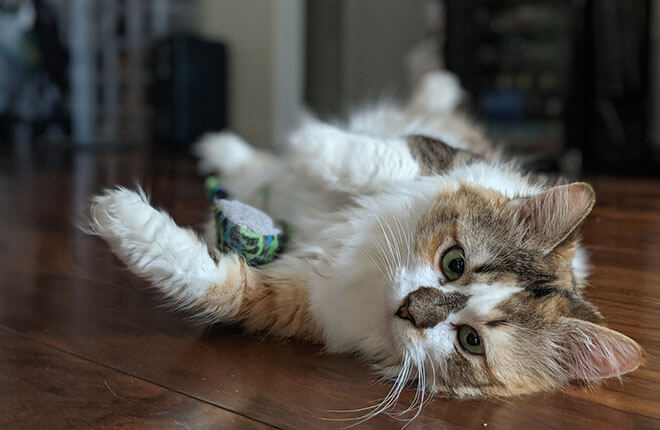When it comes to allergies and cats, many people think of cats as the cause. What you may not realize is that cats can have allergies, too. In fact, they can be allergic to a lot of the same things we are, such as foods, grasses, pollen, and dust. That means they can feel as lousy as we do when allergy season is in full bloom. Luckily, there are some things you can do to help your feline friend with their seasonal scratching or sniffles.
Symptoms of Allergies in Cats
How do you know if your cat has allergies? Like dogs, cats often express their reaction to allergens through their skin. You may see one or more of these common signs.
- Scratching at the skin and ears
- Excessive grooming (leading to fur loss)
- Hot spots
- Chewing on paws
- Skin issues such as dry, patchy areas or rashes
- Skin or ear infections
- Watery eyes
- Runny nose
- Sneezing or coughing
- Wheezing
- Irritability
- Lethargy

How are Seasonal Allergies in Cats Diagnosed?
As you can see from the list above, many signs of allergy can also be signs of other problems such as skin or respiratory infection. If your cat is experiencing any signs or symptoms that are new, changing, or concerning to you, it is very important to take your cat to the veterinarian for a thorough examination.
To help your veterinarian determine if your cat has seasonal allergies or some other medical condition, provide a complete snapshot of your cat’s health and behavior. For example, if your cat has always groomed herself at the same time of day but is now grooming herself around the clock, that can be very important information for your vet. Tell your veterinarian about any observations you’ve made related to your cat’s symptoms, including things like:
- Any environmental changes, especially in their living space (e.g., new house, new room setup, new people or pets)
- Diet changes
- Bedding changes
- Different or worsening symptoms based on exposure to the outdoor environment (this can even mean sitting inside a catio or near an open window)
- Any topical products used on your cat like shampoos, parasite prevention, sprays, etc. as well as topical products used on other household animals.
After performing a thorough examination and evaluating the medical history you provided, your veterinarian might recommend some tests to better determine the cause of your cat’s signs, including:
- Bloodwork. Common bloodwork panels include a complete blood count, biochemistry profile, and other tests like thyroid level. Cats with allergies can have elevations in some types of white blood cells. Bloodwork can also detect changes in liver and kidney function, for example.
- Urinalysis. This is a microscopic and chemical evaluation of your cat’s urine that provides information about kidney function as well as any abnormalities like bacteria in the urine.
- Allergy testing. This is typically performed either by your veterinarian or by a veterinary dermatologist. There are two types of allergy testing in cats: using a blood sample or skin testing where injections of potential allergens are made under the skin. Your veterinarian or veterinary dermatologist will help you interpret the results of the allergy testing.
- Skin diagnostics. There are several ways to assess your cat's skin for the presence of bacteria, yeast or other fungi, or parasites. Your veterinarian might take an impression of the skin with a microscope slide or obtain small samples by gently scraping the skin or plucking some hair which will then be analyzed.
Medical Treatment for Cats with Seasonal Allergies
If your veterinarian determines that your cat has seasonal allergies, a treatment plan will be developed. They may prescribe certain medications to help with itching and infection if it is present, and possibly topical medications for the skin, and/or ears. If allergy testing is performed, the results can be used to formulate allergen-specific immunotherapy (also called allergy shots or allergy drops), which is a treatment you administer to your cat at home.
What Can You Do to Help Manage Your Cat’s Seasonal Allergies?
The most important component of managing your cat’s allergies is having them evaluated by your veterinarian and then following your vet’s advice. It is ideal to reduce exposure to known allergens — or to avoid them entirely — but if your cat has seasonal allergies, that is not always possible. Some other things that can benefit your cat are:
- Preventatives. Use veterinarian-recommended flea, tick, and heartworm prevention year-round, even if you have an indoor-only cat.
- Litter. Try litter that is dust-free and fragrance-free. Each cat has a preference for litter, so ask your veterinarian for their advice.
- Baths. Routine bathing removes environmental allergens from the coat and helps with itching. Ask your veterinarian if there is a recommended shampoo product that would be safe and beneficial for your cat.
- Dust control. Minimize dust and dirt in the home with frequent vacuuming, dusting, and mopping. Be sure to include curtains and furniture. Make sure that any cleaning products used are safe for animals.
- Clean air. Use HEPA filters for your home’s air handling system and try air purifiers.
- Beds. Wash pet and people bedding frequently. Your veterinarian might ask about the detergent you use in case it contains ingredients that could be allergenic.
- Nutrition. Feed a well-balanced diet recommended by your veterinarian.
- Supplements. Supplements, like fish oil, might be recommended by your veterinarian.
Continue to regularly monitor your cat for new or changing signs or behaviors. If you observe any or you have concerns or questions, contact your veterinarian.
If you suspect your cat is experiencing seasonal allergies, it’s worth a visit to your veterinarian. Our feline friends don’t have to suffer from itchy skin or a sniffly nose. A little medical support and a few changes around the house could be all your cat needs to feel like his or her allergy-free self.
ZPC-01265R1



